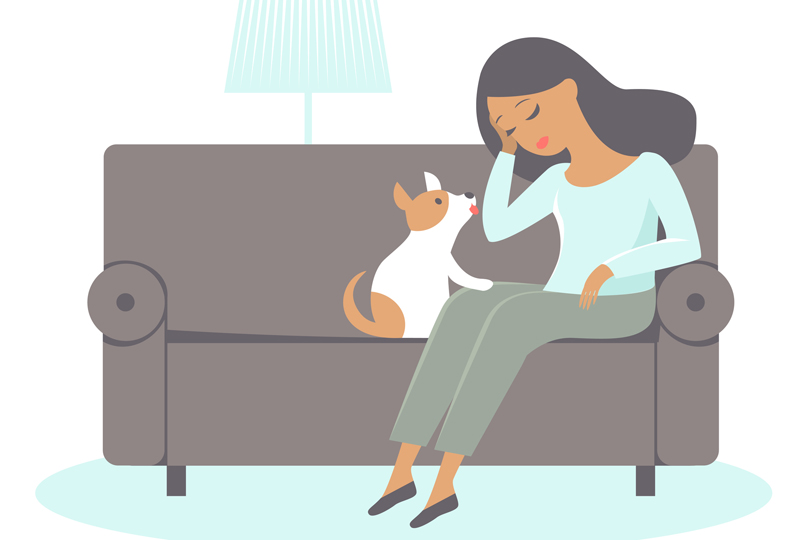By Angela Serednicki
Welcoming my mini goldendoodle, Stella, into my life was one of the best decisions I ever made, but it wasn’t always easy. Raising a puppy alone and dealing with inevitable sleep deprivation was one of the most challenging things I’ve experienced. Despite having a family dog growing up, the anxiety of being solely responsible for such a small, curious, and hyper creature hit me like a ton of bricks.
What are the Puppy Blues?
According to a study by ManyPets, nearly 70 percent of puppy parents reported symptoms of anxiety, depression, or both during the early stages of dog ownership. This feeling is called the puppy blues.
The Canadian Kennel Club describes the puppy blues as a result of a significant lifestyle shift, typically temporary and lasting about two to three weeks. Meanwhile, lack of sleep, potty training challenges and unexpected expenses associated with a new puppy can also exacerbate these emotions.
If you’re experiencing the puppy blues, know you’re not alone. Whether you’re a first-time dog owner or welcome another pup to your pack, your feelings are valid.
Speaking Out About the Puppy Blues
One content creator, Nistan Raiter, founder of Mind Your Business and podcast host of That’s So Sabotage, posted a TikTok video about the emotional challenges she experienced after bringing home her new puppy, Bagel.
“Nobody talks about the puppy blues, and I didn’t know it was a thing until I experienced it,” she says. “Obviously, I knew that having a puppy would be a ton of work…but all you ever see online is the romanticized version of having a puppy.” She describes that all areas of your life, like work and relationships, completely change.
“You have no time or space, now everything is devoted to the puppy you’re trying to connect with and understand. You’re trying to potty train them, ensure they get the best food, and keep them safe and happy. And the reason this was so difficult for me was because I never heard of it before.”
As more people acknowledge the importance of providing the best care for dogs, it’s not surprising that the phenomenon of puppy blues continues to grow. The popular notion that pets are the new kids and houseplants are the new pets holds some truth, for better or worse.
Pets are the New Priority
Gen Z, in particular, appears to value their pets’ unconditional love and loyalty, and they are making conscious choices to create environments that cater to their furry friends’ needs and well-being.
Amanda Pendleton, Zillow’s home trends expert, highlights the significance of this shift, noting that while young adults may be postponing having babies, they are enthusiastically embracing pet parenthood. “One recent study finds most Gen Z adults would rather have a pet than a child. As this younger generation ages into their home-buying years, it follows that their pets will have a greater influence on their moving decisions, perhaps more so than their significant other,” Pendleton stated in a press release.
The younger generations aren’t the only ones redefining what it means to be a dog parent. According to the 2023 Pinterest Predicts trend report, there’s been a 65 percent increase in searches for dog birthday party invitations and decorations and a 135 percent increase in dog party favours. The report explains that Gen X and Boomers focus on their fur babies and substitute kid-oriented gatherings with pet parties. “Nowadays, anything and everything is a good reason to celebrate the good boy of the house.”
This phenomenon of prioritizing pet parenthood isn’t only seen in how we live with our dogs and how we treat them when we can’t be around. Tech company Technavio predicts that the global pet daycare and lodging market will become an $8.4 billion dollar industry by 2024, with 34 percent of that growth coming from North America.
“I hear from pet parents nearly every day that inflation has had an impact on their wallets, with everything from pet food to treats and toys costing more than they used to,” Toronto-based Dr. Rebecca Greenstein, Veterinary Medical Advisor for Rover, stated in a press release.
“People are undoubtedly cutting costs where they can in today’s economic environment, but interestingly enough, the trade downs and cuts largely don’t apply to the health of their pets. People still prioritize the well-being of their dogs and cats when it comes to spending.”
The Calm After the Storm
Stella is turning two this month, and we’ve come a long way since the sweet-but-definitely-stressful puppy days. Whenever we meet an owner and young puppy at the park, I share the advice I wish I had heard more of back then: “It gets easier.”
Despite being overlooked, the puppy blues are a genuine and valid experience many new dog owners face. As our pets have become essential members of our families, it’s crucial to recognize the emotional toll that this responsibility can take.
TIPS FOR NAVIGATING THE PUPPY BLUES
Set Realistic Expectations: Puppies require time, patience, and training. Don’t uphold yourself or your puppy to unreasonable standards – you’re both learning together as you go.
Create a Routine: Establishing a daily routine for your puppy can help reduce stress and anxiety for you and your pup. A consistent schedule for feeding, playtime, potty breaks, and training will give your puppy a sense of security and control over your day.
Seek Support: Don’t hesitate to seek support from friends, family, or fellow puppy owners. Sharing your feelings and experiences with others who have gone through similar situations in online groups can also be comforting and reassuring.










